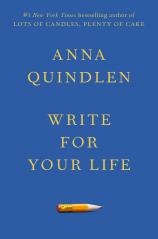Write for Your Life
Review
Write for Your Life
With a lengthy career as a New York Times columnist that won her a Pulitzer Prize, and several bestselling novels to her credit, Anna Quindlen’s writing credentials are beyond dispute. So it would surprise no one if she wanted to add a volume to the large library of books about how to write. But her latest book, WRITE FOR YOUR LIFE, isn’t a writing instruction manual. Instead, it’s a heartfelt urging to anyone to pick up a pen or sit down in front of a computer and simply record something about the experience of being alive.
In what amounts to an extended essay that easily can be read in a single sitting, Quindlen advocates for journals as a vehicle for what she hopes will be a renaissance of personal writing. “But the liberating thing about a journal is that in most cases it is only for you,” she writes. “Why hide from yourself?” In the most simple terms, Quindlen argues that “writing is a way of connecting with yourself, your deepest thoughts and feelings, particularly when the first seem mysterious and the second hard to fathom.”
"[WRITE FOR YOUR LIFE is] a heartfelt urging to anyone to pick up a pen or sit down in front of a computer and simply record something about the experience of being alive."
When Anne Frank began her diary as a 13-year-old in Amsterdam in 1942, she had no idea that this chronicle of heroism and horror someday would be read by millions as part of the historical record of the Holocaust. “She’s telling the story of one small and unremarkable life that has come to stand for millions of others, and so became remarkable,” Quindlen says. The same is true of the nearly three-decades-old Freedom Writers project created by Long Beach, California high school teacher Erin Gruwell that challenged students considered “unteachable” to record their life experiences; it has now spawned countless similar projects throughout the United States.
But even as Quindlen promotes journal writing as a vehicle for self-examination and self-discovery, she also offers it as an opportunity, often sadly missed, for people to leave a record of their lives for a larger, if still intimate, audience: “There are no journals written by my father. If I could go back in time, I would ask him to keep one, but maybe, like so many busy people, he would think it was a waste of the scant hours in his day…. I’d just like a little piece of something. That’s all I want, just a little piece. Couldn’t you manage that, for someone you love, who would probably treasure it every bit as much as I would?”
Quindlen offers a variety of additional prototypes. One of them is the parallel chart project created by a professor at Columbia University’s medical school. That exercise asks third-year medical students to record their human reactions to patients they’re treating. According to Quindlen, early studies indicate that participants “strengthen their ability to connect with those they treat, and with themselves, too.” She also provides a helpful prompt for non-physicians to translate this technique into something as mundane as one’s daily calendar.
In addition to journals, Quindlen is a passionate advocate for writing letters, preferably by hand (yes, there’s an organization called the Handwritten Letter Appreciation Society). Noting the gap in the historical record that will exist with the demise of letter writing (who will read the collected texts of some famous writer? she wonders), she points to the importance of a pen pal project called Penpalooza. Created during the early days of the coronavirus pandemic, she likens it to highly personal accounts of the 1918 Spanish Flu that exist only because people of that era wrote letters about their experiences.
Quindlen offers frequent reminders that the kind of writing she’s promoting doesn’t depend on skill or polish for its value, not least because its audience may never extend beyond the person doing the writing. “Put down a word, and then another. What is the harm?” she asks. Her zeal for encouraging more people to engage in this form of communication brings to mind Walt Whitman’s words: “That you are here --- that life exists and identity, / That the powerful play goes on, and you may contribute a verse.” When it comes to that sentiment, Quindlen clearly is a kindred spirit: “Tell your story, record your thoughts, note your feelings, write it down.” With advice like that from two accomplished writers, what more inspiration could anyone need?
Reviewed by Harvey Freedenberg on April 15, 2022
Write for Your Life
- Publication Date: April 12, 2022
- Genres: Inspirational, Motivational, Nonfiction, Personal Growth, Writing
- Hardcover: 240 pages
- Publisher: Random House
- ISBN-10: 0593229835
- ISBN-13: 9780593229835




